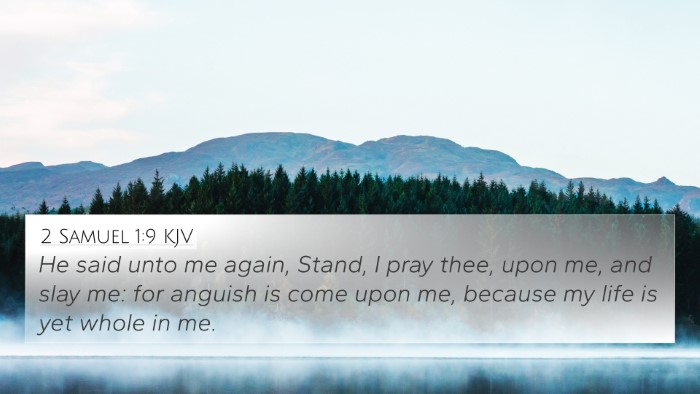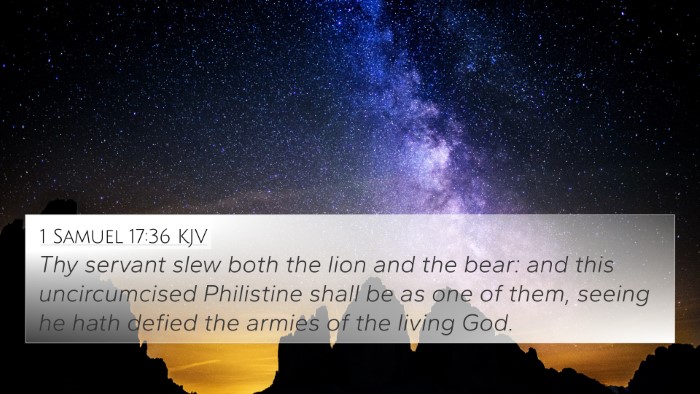Understanding 1 Chronicles 10:4
Verse: "Then said Saul to his armor-bearer, Draw thy sword, and thrust me through therewith; lest these uncircumcised come and thrust me through, and abuse me." But his armor-bearer would not; for he was sore afraid. Therefore Saul took a sword, and fell upon it.
This verse narrates a critical moment in the life of King Saul as he faces the grim reality of defeat and death. It encapsulates themes of despair, the honor of kingship, and the struggle against an overwhelming foe. The significance of this verse can be better understood by examining several intertwined commentaries.
Commentary Insights
Matthew Henry's Commentary: Henry emphasizes the notion of despair that Saul feels in this moment. Saul's request to his armor-bearer to kill him reflects his fear of dishonor in death at the hands of the Philistines. Instead of facing the humiliation of capture and abuse, Saul prefers to take his own life, which reveals his desperation. Henry also notes the bravery of the armor-bearer, who refuses to follow through with Saul's command, indicating a moral stand against violence and a refusal to take a life out of fear.
Albert Barnes' Commentary: Barnes elaborates on the psychological state of Saul, suggesting that his actions stem from a deeply ingrained sense of failure - he has lost not only the battle but also the support of God. Barnes connects this despair to the overarching theme of divine judgment due to Saul's previous disobedience to God, thus illustrating the connection between one’s actions and their consequences in the biblical narrative.
Adam Clarke's Commentary: Clarke provides a historical context surrounding Saul's suicide, detailing the severity of the battle and the psychological toll it took on him. He points out how Saul’s decision reflects the tragic end of a king who could have led Israel differently had he remained faithful to God. Clarke also notes the implications for the armor-bearer, highlighting the loyalty and moral conflict he faces in a situation where he must choose between duty and morality.
Connections and Cross-References
1 Chronicles 10:4 engages with several related biblical themes and verses:
- 1 Samuel 31:4-5: The detailed account of Saul's death, further illustrating his tragic end.
- 2 Samuel 1:10: The aftermath of Saul’s death and the reaction from David, indicating the ongoing legacy of Saul's reign.
- Judges 9:54: The story of Abimelech, who also took his life to avoid dishonor.
- 2 Samuel 1:16: David's pronouncement of judgment on the messenger who claimed to have killed Saul, showcasing reverence for God's anointed.
- Proverbs 24:17: A verse emphasizing the moral lesson regarding how we should not rejoice in the fall of our enemies.
- Luke 4:27: References to others in Israel who in their unbelief missed God’s mercy, paralleling Saul's rejection of divine guidance.
- Philippians 1:21: A reflective take on life and death, contrasting Saul’s despair with the hopeful attitude of Paul.
Thematic Bible Verse Connections
This passage also brings to light broader biblical themes, such as:
- Despair and Honor: Explores the conflict between maintaining honor and succumbing to despair.
- Moral Decisions: The moral dilemmas faced by individuals in moments of crisis.
- Divine Judgment: Illustrates the consequences of disobedience to God and the resultant fallout.
- Loyalty vs. Duty: The strife of the armor-bearer reflects the challenge of loyalty in morally ambiguous situations.
Conclusion
1 Chronicles 10:4 serves as a poignant narrative that bridges despair with the weight of legacy. It raises important themes of how we view honor, the heavy burden of leadership, and the consequences of choices. For those studying the Bible, examining the interconnectedness of this verse with others through comparative Bible verse analysis can deepen understanding and provide insight into God’s overarching message across scripture. The exploration of these clips of relational Scripture offers valuable tools for enriching one's biblical studies and enhancing theological reflection.



















